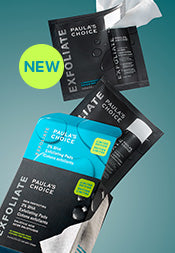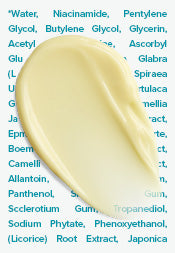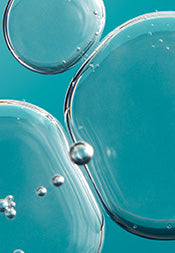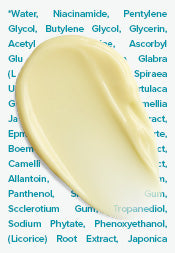What You Need to Know About Peptides for Your Skin
If you haven’t heard about the use of peptides in skin care products, we’re going to tell you what you’ve been missing. Peptides have come a long way and the new research on how they benefit the skin is remarkable (5). Some of the information out there is overblown, but other aspects of peptides for skin deserve your attention. Here's the facts versus fiction.
What are peptides?
First, we need to start with the science: Peptides are fragments of proteins. On their own, peptides are made up of Amino Acids. When Amino Acids are combined in certain formations, they create specific peptides (and there are hundreds of peptides), and when peptides are formed in a certain way, they make specific proteins.
Proteins are the fundamental building blocks of skin. Without peptides, skin doesn’t remain intact, and the result is loss of firmness, appearance of wrinkles, texture changes, and skin that doesn’t bounce back as it once did.
What’s so fascinating about peptides is that abundant research has clearly shown that each of them works in very specific ways to target an exact skincare need. They also teach skin to do what's required to help revitalise these building blocks, which can help revive ageing skin.
What are the benefits of peptides in skin care?
Although there are intriguing reasons to consider peptides as a significant part of a skincare formula as we did with our unique Peptide Booster (2). A similar approach was taken with our Hyaluronic Acid + Peptide Lip Booster, where specialised peptides work with key plant extracts to target loss of firmness and volume on lips. Hyaluronic Acid helps smooth lines as this peptide lip treatment interrupts factors which cause them to become thinner over time. It’s a great example of peptides delivering highly targeted results alongside tried-and-true hydrators. where specialised peptides work with key plant extracts to target loss of firmness and volume on lips. Hyaluronic acid helps smooth lines as this peptide lip treatment interrupts factors which cause them to become thinner over time. It’s a great example of peptides delivering highly targeted results alongside tried-and-true hydrators.
Despite the legitimate enthusiasm, we also want you to know there's a lot of hype around what peptides can do. Sadly, the hype is often completely blown out of proportion. Peptides can do amazing things for the skin, but they do not replace what cosmetic corrective procedures can do, as many companies have claimed over the years.
Also noteworthy: There's no single ingredient solution for all the signs of ageing and other skin problems we endure, and peptides are no exception. You would be cheating your skin to think that any single peptide (or any other specific skincare ingredient) is your skin's solo rescuer. Skin needs a broad mix of beneficial ingredients to look and feel its best. Promising new research has us excited about using peptides in skin care products. Their ability to help revitalise skin's building blocks so it becomes more resilient is a wonderful asset for skin, but keep your expectations realistic, or you will be disappointed (3,4).
What can peptides be mixed with?
Peptides can be mixed with any other skin-beneficial ingredients, because as special as peptides are, they need "friends" in the form of supporting ingredients to help address all the needs of the skin.
Any skin care formula worthy of your hard-earned Singapore dollars must include the specialised ingredients such as antioxidants, skin-replenishing ingredients, and skin-restoring ingredients (which include peptides). As a reminder (because it's so important), when peptides are blended with antioxidants, skin-soothing ingredients, and skin-replenishing ingredients, they can address multiple signs of ageing and with consistent use, you will love the results!
What are collagen peptides?
Recently there has been a lot of attention paid to the use of collagen peptides – both in supplements and in topical skin care products. Research shows these peptides (which can be extracted either from plant or animal collagen) have benefits in both applications. Taking collagen peptides orally can result in smoother, more hydrated skin (1). Preliminary studies show topical use of collagen peptides could have the same effect – though as we note below, these benefits don’t mean it is the “best” peptide, it’s simply one more to add to your anti-ageing skin care arsenal.
Copper peptide: fact or fiction?
Speaking of a single skincare ingredient being overly hyped, copper peptide is certainly one of them. The spin begins with the notion that skin’s building blocks are assembled by copper (7). So, the logic would follow that you must have copper peptide in your skin care products to get that reparative benefit. Although it is true that copper peptide is a skin-restoring ingredient, there are lots of other peptides with equally, if not more impressive, properties.
To keep it in perspective, although there are studies showing the dramatic positive effects of copper peptides, those studies rarely, if ever, compare copper peptides to other peptides or other ingredients like potent antioxidants. It’s important to realise that many ingredients have extraordinary research proving their value for skin, not just copper peptide. That’s the pitfall of getting too wrapped up in one single ingredient. Skincare isn’t that simple!
Ironically there’s also research about copper being potentially toxic to skin. However, this research is mostly about pure copper in the body, not as a peptide applied to the skin. The negative effects are about what happens when copper is out of balance, meaning too much copper is present such as from excess dietary or supplement intake (10).
Peptide Skin Care: The Bottom Line
Peptides can be a great addition to your skincare routine because they can address so many skin concerns. But as with all anti-ageing ingredients, the best approach is to use products such as moisturizers and serums that use a cocktail of great ingredients, including antioxidants and skin-restoring substances (plus daily broad-spectrum sunscreen) to visibly improve the health and appearance of your skin (9)!
Learn more about skincare ingredients.
Shop Paula’s Choice fragrance-free, non irritating peptide skincare best sellers.
References for this information:
The Journal of Clinical and Aesthetic Dermatology, January 2020, pages 44-49
Cosmetics, May 2017, pages 1-14
ChemMedChem, August 2016, issue 16, pages 1850-1855
Bulletin of Experimental Biology and Medicine, May 2016, issue 1, pages 175-178
Journal of Drugs in Dermatology, April 2016, supplemental, pages 63-71
Austin Journal of Pharmacology and Therapeutics, August 2014, pages 1-9
Biological Trace Element Research, August 2013, issue 2, pages 268-274
Clinical Chemistry and Laboratory Medicine, April 2013, pages 1–8
Dermato Endocrinology, July 2012, issue 3, pages 308–319
Nutrients, December 2015, pages 10,053–10,064
Recommended Products
Peptide Booster
Hyaluronic Acid + Peptide Lip Booster
CLINICAL 0.3% Retinol + 2% Bakuchiol Treatment












